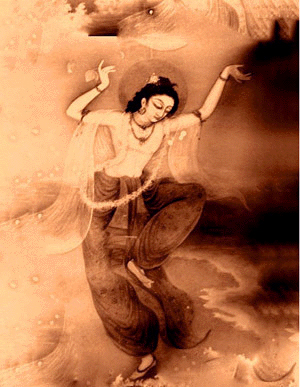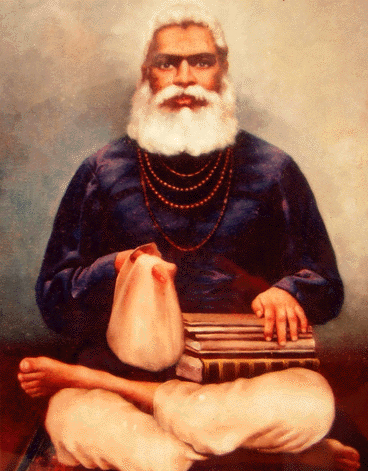Sri Sanmodana Bhasyam, Part 16
BY: SUN STAFF
Jun 12, 2016 — CANADA (SUN) — A commentary on Lord Caitanya’s ‘Siksastakam’ by HDG Srila Bhaktivinoda Thakur, with a Bengali song for each verse that expands upon Mahaprabhu’s devotional moods (Sanskrit, 1886).
When anuraga is overflooded by the magnificent ocean of ecstatic love and the devotee completely loses himself in transcendental madness, mahabhava is attained. In this stage, even the dropping of an eyelid that blocks the devotee’s view of the Lord for less than a second is intolerable. In the ecstacy of separation, a mere moment is stretched to timeless eternity.
In mahabhava, in both union and separation, all the symptoms of sattvika and sancari bhavas manifest to the fullest degree. Lord Caitanya pours an ocean of meaning from the pitcher of this sloka for a full elaboration on the different gradations of loving ecstacy that are hinted at here, one should consult Srila Jiva Goswami’s Pritisandarbha.
The word yugayitam is a simple and direct expression of timelessness; the phrase govinda virahena conveys deep feelings of separation (vipralambha). Fully Krsna conscious rasika devotee have subdivided vipralambha into purva raga (preliminary attraction), mana (seeming anger) and pravasa (separation by distance). In this sloka, Caitanya Mahaprabhu reveals that the sadhaka dwelling within this world need only relish the purva raga stage of vipralambha ecstacy.
…Ten conditions in the sadhaka’s person. They are: pondering, sleeplessness, perturbation, emaciation, pallor, incoherent speech, a stricken condition, madness, delusion and death (unconscious).
Sri Caitanya Caritamrita, Antya 20.4041:
“In My agitation a day never ends, for every moment seems like a millennium. Pouring incessant tears, My eyes are like clouds in the rainy season.
“The three words have become void because of separation from Govinda. I feel as if I were burning alive in a slow fire.”
“O Govinda, the entire world is but a void in Your absence; My eyes are raining tears like monsoon clouds, and each batting of My eyelids seems like a millennium.”
This is an excellent expression of vipralambharasa.
This sloka was composed to teach the jata-rati devotee that it is absolutely essential he take up the vipralambharasa not caring for sambhoga or enjoyment. In material life, viraha or separation causes only grief. But on the transcendental plane, viraha produces extreme ecstacy within, though externally the inner ecstacy is reflected as acute anguish.
Vipralambha therefore nourishes sambhoga or enjoyment within. In fact, sambhoga is an external feature of the vipralambharasa in the state known as prema vaicitra or loving variegatedness. The devotee incessantly and intensely recollects Krsna and His pastimes in vipralambharasa, to the point of never forgetting Krsna. This is indeed the superexcellent stage of bhajana.
The sambhoga exhibited by the pretentious group known as gauranga-najari, who do not sincerely practice Krsna consciousness but claim to be devotees, is simply a result of their insincerity. That sambhoga is a severe impediment on the pure devotional path. It is factually only selfpleasure; hence it is bereft of sincere devotion to Krsna.
Just by knowing the meaning of the sloka, “The desire to gratify one’s own senses is kama (lust), but the desire to please the senses of Lord Krsna is prema (love)” (C.C. Adi 4.165), one is spared from the urge to sense enjoyment. Unfortunately, unscrupulous pseudo devotees try to disguise their lusty urges by presenting Lord Caitanya to the world as a pleasure seeker (nagari). But the true meaning of Lord Caitanya’s pastimes is that Lord Krsna descended as Lord Caitanya to accept the sentiments of an asrayatattva devotee who is constantly absorbed in the vipralambha mood.
As mentioned, vipralambha nourishes enjoyment, but it is Krsna’s enjoyment that is being nourished by the pure devotee in this mood. Caitanya Mahaprabhu is eternally the embodiment of vipralambharasa, and He personally propagates this means of nourishing Krsna’s pleasure among the jivas, who must discard their futile attempts for sambhogarasa.
Sri Krishna Karanamrita, sloka 41:
“O supreme shelter of the destitute, O Lord Hari, You are an ocean of mercy! Alas! Oh alas! Without seeing Your lovely face how am I going to live through these wretched days and nights?”
Srila Madhavendra Puri’s words as recorded in Padyavali, text 400:
“O compassionate Lord of the helpless! O Lord of Mathura! When will I be able to see You? Your absence has made my stricken heart extremely anxious. O my beloved! What am I to do now?”
In Ujjvala-nilamali, text 64:
“Srimati Radharani is completely smitten. She is experiencing the limitless ocean of suffering as the ten conditions of separation overcome Her. She ponderings without sleeping and suffers perturbations, she has become emaciated and pallid, she speaks incoherently, is stricken, mad and deluded and swoons almost to death.”
#Sri Sanmodana Bhasyam





Leave a Reply